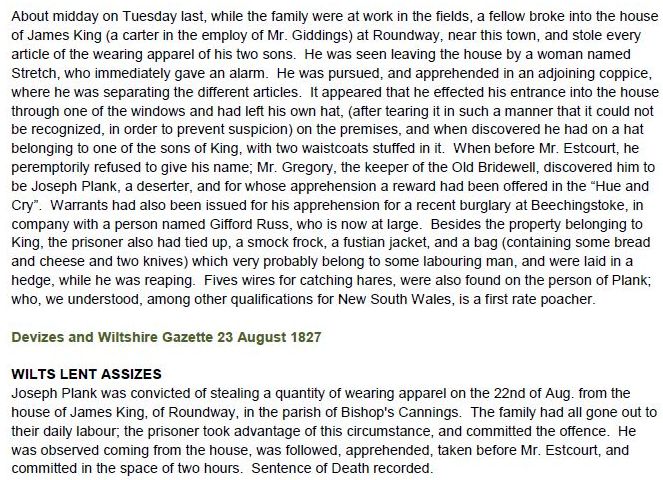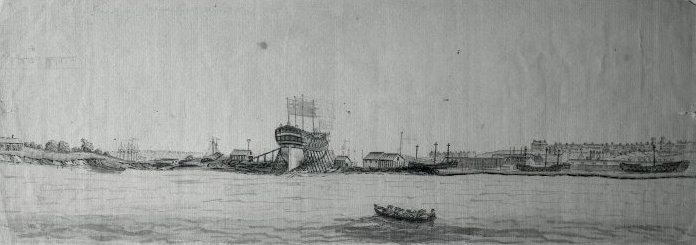|
HMS Bellerophon
on the stocks at Frindsbury, 1786, prior to being launching - Src:
Collection: British Museum.
Joseph Plank – House Breaking -
1832: Salisbury Assizes Tuesday –
Joseph Plank was indicted for
breaking and entering the dwelling-house of Thos. Shipman, at
Woodborough, on the 29th of August last, and stealing there from his
property, a cloth, two pairs of scissors, and other articles.
Verdict, convicted "Guilty
of housebreaking" - Although Joseph Plank was
initially sentenced to death, this was commuted to transportation
for life and Joseph was held in the prison hulk Captivity in
Devonport pending a ship for transportation. The prison hulk
registers record that Joseph Plank was 43 years of age and was held
on the Captivity until 25 September 1832, sentenced to be
transported for life.
The Salisbury and Winchester
Journal – Monday, 12 March 1832
On Monday last the following
convicts were removed from Fisherton gaol, and on Tuesday they were
placed on board the Captivity hulk, Devonport
Harbour:
Prison hulks were
decommissioned ships that
authorities used as floating prisons in the 18th and 19th centuries.
They were especially popular in England. The term "prison hulk" is a
ship that is afloat, but incapable of going to
sea
Converting the ships to prison
hulks involved removal of the rigging, masts and rudders, and
various other features required for sailing. Some hulks retained
some of these features, but all were rendered inoperable or
unseaworthy in some way. The internal structure was also
reconfigured with various features, including jail cells, in order
to accommodate convicted criminals
The hulks, which retained only
their ability to float, were typically located in harbours. This
made them convenient temporary holding quarters for convicts
awaiting transportation to Australia The "Captivity" was originally
called the She was paid off and
converted to a prison ship in 1815, and was renamed "Captivity" in
1824 to free the name for another ship. Moved to Plymouth in 1826,
she continued in service until 1834, when the last convicts
left.
The Salisbury and Winchester
Journal – Monday, 21 May 1832 (OPC Notes)
Joseph was one of 192 convicts
transported on the Circassian, being disposed of by
transportation to Van Diemen’s Land (Tasmania departing on 4
November 1832. The Convict Muster Records state that Joseph died on
the voyage and never arrived in Australia.
There is no record of
Joseph having a family of his own.
Images and data used in this site copyright - ©
Descendant input to up-date family pages is very welcome -
more detailed information available on request.
|













